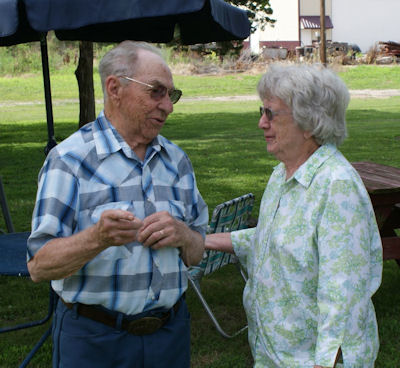 As life long members of the Lomax community the Sparrow family has been an important part of many lives.
As life long members of the Lomax community the Sparrow family has been an important part of many lives.
The Hancock-Henderson Quill, Inc.
by, db Conard, The Quill
 As life long members of the Lomax community the Sparrow family has been an important part of many lives.
As life long members of the Lomax community the Sparrow family has been an important part of many lives.
On Sunday afternoon while sitting in Beryl Sparrows back yard on a swing that rocked as we talked, I got a pretty good sense of a very interesting family and of Lloyd Beryl Sparrow.
All that is left to mark the spot of the Lomax Canning Company, is the frame for the tower that held the old canning plant water tower, and some of the old foundation.
Canning was the business that the Sparrow family brought to the region in 1912 when they started a company known as the Lomax Canning Company.
The canning company had been the brain child of two brothers Lloyd W, and Orville Sparrow (Beryl's father and uncle). The family had begun as farmers, but felt that there would be opportunity in processing and canning their own crops.
It all started as the Sparrow Farm which came from Beryl's Grandfather William, with a little more than 400 acres.
Through contracting additional land the farming almost doubled to over 800 acres of ground, producing crops for the new canning company.
Beryl's dad and his brother, seeing the same opportunity on both sides of the river, decided to split up the business. Orville went to Columbus Junction on the Iowa side of the river and started his own canning business.
What the two brothers had started continued to grow in Lomax and by the early 40s had grown to over 3000 acres of land. The canning company employed as many as 250 women and 40 local men.
Also, there were as many as 400 migrant workers brought in to harvest the crops. For the most part the migrant families were housed in camps on the outskirts of both sides of town, and had a big impact on the communities economy. In addition to tomatoes, the canning plant also canned sorghum, molasses, and sauerkraut.
For 56 years the Lomax Canning Company played a major part in the lives of so many different people. Everything about the business was hard work. From the harvesting of the crops to the management of the processing and canning plant, it was a family affair.
Beryl worked with his dad up through high school.
After graduation, he took some college business courses and then joined his brother Vernal in a farming partnership outside of Lomax.
Beryl stumbled into his primary business of heavy equipment, because he needed to clear or dig a lot of drainage ditches. After studying the pros and cons along with the motivation of a Caterpillar salesman, Beryl figured it would be better to own than to rent the heavy equipment necessary for his farming operation, and that his neighbors would help justify the expense because of their earth moving needs.
One Caterpillar grew into another, and then came trailers, trucks, and even buses.
Due to the failing health of his dad, Beryl got out of the heavy equipment business to help his dad full time in the canning business.
For six more years the Lomax Canning Co. continued as a major part of the Lomax community. It was in 1968 that the business closed after 56 years of production.
Big business with new technology on the west coast had made it hard for the small town canning operations to compete.
The tomato crops moved west because of larger and more efficient operations which made harvesting and transportion impractical in the Heartland.
Twenty-two years later, Beryl retired from farming in 1990 when his sons Byron and Martin took over, just as Beryl had done for his dad.
At 70 years, he retired so that he could go to work in other ways that gave him more flexibility with his time.
It is obvious that Beryl's best half is his wife Fern who I know will skin me for telling Beryl's side of the story on how they began as a couple.
He said he found her on Rat Turd Lane riding her bicycle. The lane, no longer in existence, use to be near the Lomax Post Office.
Such an interesting name as a place for a beginning of a relationship that resulted in a family of five children (Carla, Lloyd, Ann, Martin and Byron) and eight grandchildren, and five great-grandchildren.
What a wonderful foundation to carry on the Sparrow legacy.